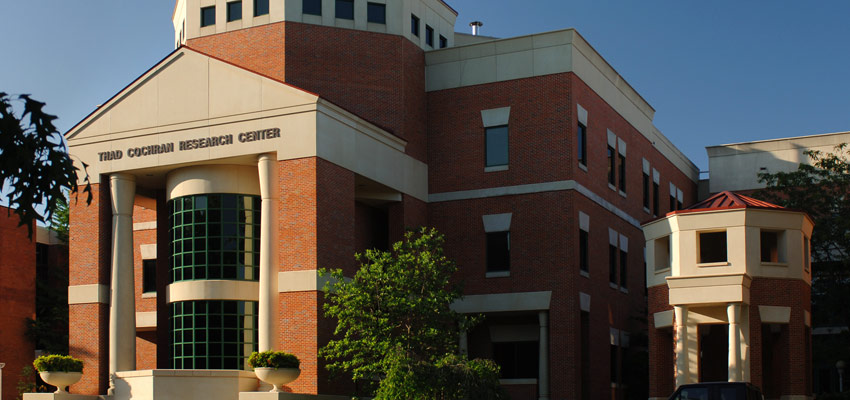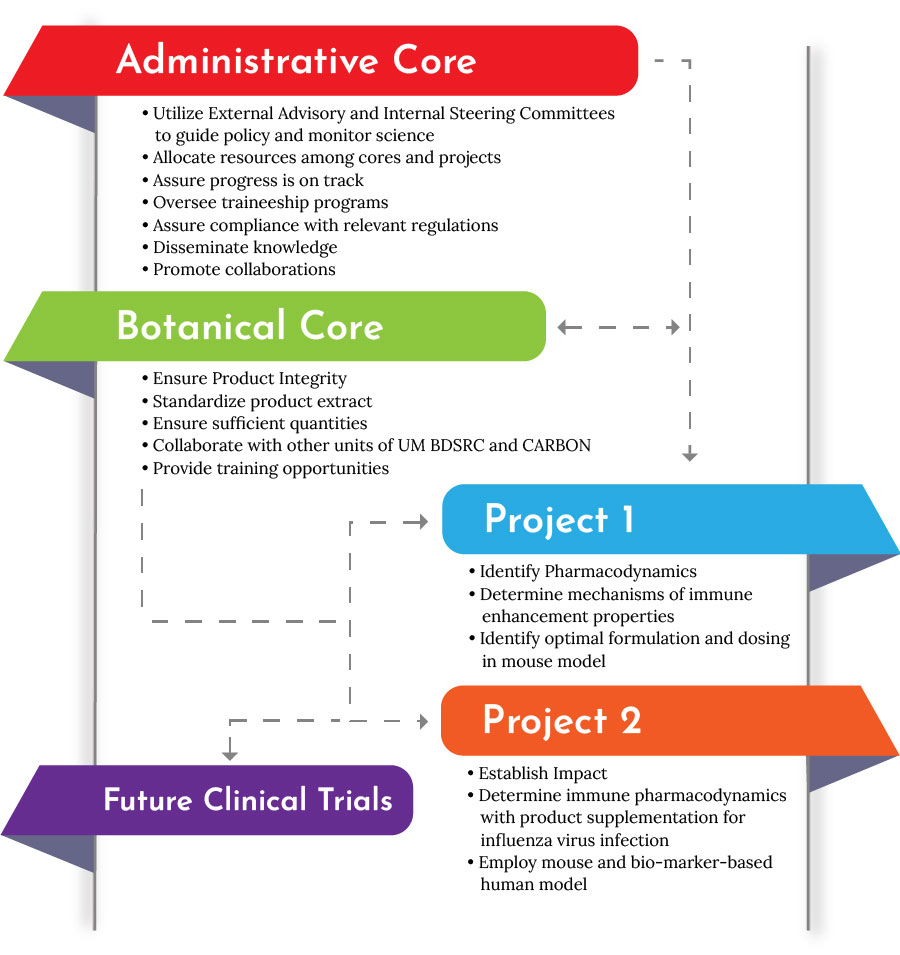
Established in 2020
The University of Mississippi Botanical Dietary Supplements Research Center (UM BDSRC) is a component of the NIH Consortium for Advancing Research on Botanicals and other Natural Products (CARBON) Program. It was created to foster collaborations between scientists at the University of Mississippi housed at the main campus in Oxford and the Medical Center in Jackson.
Public health relevance of our research
Arthrospira platensis (commonly known as spirulina) is a top selling botanical for improving immune health. This center’s research is directed towards generating sufficient data to optimally design future human intervention studies to evaluate the utility of Spirulina-derived oral supplements in promoting resilience against viral infections such as influenza. The use of a Spirulina-derived oral supplement may provide an important complementary approach to currently available antiviral therapies that is inexpensive, safe and readily available to the public.
What is the purpose of this research?
The overarching purpose of the UM BDSRC is to develop the knowledge base necessary to identify optimal immune-enhancing effects that will provide the scientific rationale to optimize the design of future human intervention studies to evaluate the utility of Spirulina-derived oral supplements in promoting resilience against and/or recovery from respiratory viral infections such as influenza.
Why is it significant?
Influenza virus infection is a continual, worldwide public health problem that has challenged western society for centuries. The CDC estimates that the burden of illness during the 2017–2018 flu season included 48.8 million symptomatically infected people in the U.S., 959,000 patient hospitalizations, and 79,400 deaths. Since the modern flu vaccine program has moderated but not eliminated infection risk, enhancement of host antiviral immune response through the use of botanicals may provide an important complementary approach that is inexpensive, safe, and readily available to the public.
What is the rationale for selecting Spirulina as the botanical product for our research?
Arthrospira platensis (Spirulina) is a cyanobacterium that has been used as a food for centuries and more recently as a health supplement by a large segment of global society. Although early interest in commercial production of Spirulina was focused mainly on its nutrient and protein content, it has emerged as a popular dietary supplement due to scientific evidence supporting various human health benefits such as immune-enhancing and antiviral properties.
About 20 years ago the UM National Center for Natural Products Research (NCNPR) established a unit to investigate the immune-enhancing properties of botanicals and dietary supplements. Numerous products that are traditionally used to enhance immune function were evaluated, and extracts from Arthrospira platensis were found to be hundreds of times more active than all others tested. Based on this discovery, the NCNPR invested substantial research effort to investigate the immune-enhancing properties and therapeutic applications of Spirulina.
A growing body of evidence generated from the NCNPR and the literature indicate that oral consumption of Spirulina products are particularly useful natural products for providing resilience against influenza viral infection. Research demonstrates that a major mechanism by which Spirulina products provide anti-viral resilience is through its impact on immune function. Through this research effort Braun-type lipoproteins were identified as the predominant macrophage-activating principal within Spirulina, and a patented extract (ImmulinaTM) was developed that preferentially enriches for the level of these active macromolecules from the raw material. The ImmulinaTM extract has been commercially available for the last 15 years and is the product research focus for our UM BDSRC.
Objectives of UM BDSRC Units That Will Lead to Future Clinical Trials

Organizational chart for the UM BDSRC
The structure of the center is organized to include an Administrative Core, a Botanical Core, and two Research Projects.

Contact Us!
For Collaboration and Scientific Research
Ikhlas Khan, PhD
UM BDSRC Co-Director
khan@olemiss.edu
Nirmal Pugh, PhD
UM BDSRC Co-Director
ndpugh@olemiss.edu
For general assistance
Gray Dale
UM BDSRC Program Manager
gdale@olemiss.edu
662-915-1176